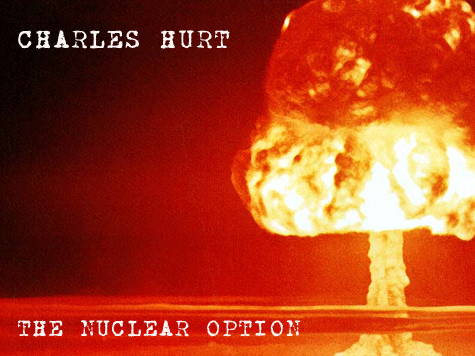**NOTE FROM SENIOR MANAGEMENT**
On 9 August, 1945 the United States broke the will of the military junta running Japan by dropping a second, more devastating nuclear bomb. Even more than the decision to drop the first bomb on Hiroshima three days before, this was the real ‘”nuclear option.” It sent a clear message to the world that this is total war and we will continue with your destruction until you surrender–unconditionally.
Seventy years later, folks have forgotten the moral clarity and certitude with which we made the decision to act. It is that clarity and certitude mixed with a healthy dose of piss and vinegar that you will get every week from Charles Hurt: writer, polemicist, southerner.
Charlie’s curriculum vitae is long and storied. Let’s just say he speaks with experience and smarts. Folks: Charlie Hurt and “The Nuclear Option.”
***
This week’s shock fire sale of the once-vaunted Washington Post to a home-shopping magnate was another inglorious jolt reminding us that newspapers have committed themselves to a slow and painful suicide. It was like watching a body in free-fall from some high rooftop slamming off another windowsill in its long journey to the pavement.
When I was a boy growing up in a one-stoplight tobacco town in Southside Virginia, my father subscribed to a solid 12 pounds of newspapers every day from around the country. I know this because one of my first jobs was walking to the post office to collect them all. They were rolled into logs and wrapped in brown paper. I walked them home in a little cart. Not bad work for a quarter.
In the evening, my father would sit in his office, take one of the fat rolls, and using his pen-knife, slice through the brown paper until it plumped open. These newspapers–including the Washington Post–would unfurl into exotic and exciting stories from far-away places that dazzled a 10-year-old kid living in a small town in the middle of nowhere.
There were stories of mysterious crimes, intrigue at the morgue, aching romances, and towering greed among vastly wealthy people. There was all the clandestine lurking between two superpowers on the brink of nuclear annihilation. And there was always the simple stories about mundane life that were so beautifully written. In those days, no one was better at that than the Washington Post.
One story I recall was about a crew of construction workers taking their lunch break during nice weather. They sat on a wall along a sidewalk and watched all the women professionals in pretty dresses and high heels walk by. My humble description of the story does not do it justice. But in the hands of one of the old giants of The Washington Post Style section, it was an absolute masterpiece. It was about human interaction at its most primal. It revealed people’s dreams and imaginations. It was entertaining. Most of all, it was real.
And it is the sort of story the Washington Post hasn’t been able to pull off in many, many years. Not that they would attempt such a story that might be viewed by someone as insensitive. Sexist, somehow because it depicted working men looking at pretty women in dresses. Women smiling back.
Whatever. Those stories–and that is just one of thousands and thousands that those great writers produced every year–were real. They were not vetted by the political correctness police that came to dominate every major newspaper newsroom in America. And those writers didn’t go to fancy university “journalism” schools to trade in their instincts, wits, and talents in exchange for a stupid degree.
So the Post will be gone from the Graham family. Its soul died long ago. All that was left of it was worth just a paltry $250 million. Even the tedious knock-off website Huffington Post–which mainly survives by Internet trickery and sleight of mouse–was somehow worth $315 million when AOL bought it a few years back.
It is hard to say what all this means for the future of the news business. Will the Amazon.com approach to newspapering save the business?
One thing is for certain: It cannot be worse than the stewardship we have seen from the “professionals” all these years. And this sad demise could not happen to a more deserving group of people.
email: charleshurt@live.com; twitter: @charleshurt

COMMENTS
Please let us know if you're having issues with commenting.